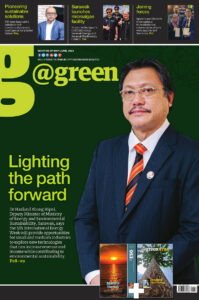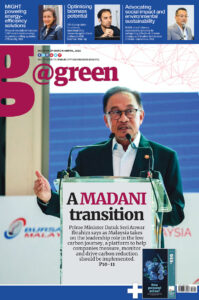With a population of 6.5 million and another one million foreign workers living and working in Selangor, the size and amount of waste generated in the State are the highest and most extensive in Malaysia.
Selangor contributes about 28 per cent of the country’s total waste output and has been increasing exponentially over the years.
Waste management and public cleansing is a dangerous and challenging business, but somebody must do the dirty job to collect, transfer, treat and dispose of it.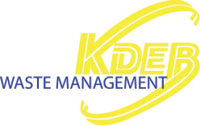
Established in 2016, KDEB Waste Management Sdn Bhd (KDEBWM) is a wholly-owned subsidiary of Menteri Besar Selangor Incorporated (MBI), managing domestic waste collection public cleansing services in Selangor.
Since 2019, KDEBWM was also entrusted to manage domestic waste collection and bulky waste at Industrial, Commercial and Institutions (ICI) and clean public parks.
KDEBWM Managing Director Ramli Mohd Tahir said: “The waste management business and services are no longer limited to just collecting waste and disposing it to the landfills.
“As the waste output continues to increase, we can’t afford to take up more land for landfills every six to seven years. Eventually, we will run out of space. It is no longer sustainable and safe.
“KDEBWM has taken the responsibility to push the State to address this issue and look into sustainable solutions and initiatives to manage all wastes.”
Initiatives and solutions
KDEBWM is committed to implementing recycling initiatives in Selangor and establishing Material Recovery Facilities (MRF).
Ramli shared: “By having proper MRFs, recycling centres, we hope to minimise waste sent to the landfills, as well as reduce illegal dumping.
“Plastic wastes and non-biodegradables make up about 30 per cent of the waste outputs and are sent to the recycle centres.
“We already set up two recycling centres located at Meru and Bandar Bukit Puchong. Each centre processes about 15 to 20 tonnes of recycled material per day.
“And we will launch five more recycle centres this year. By 2023, 12 recycle centres are expected to be built at respective local councils.”
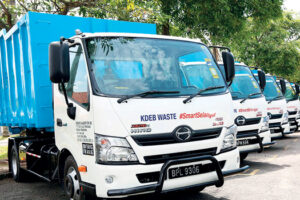
He said with more MRFs, KDEBWM can collect and recycle more, and fewer wastes are sent to landfills. He also disclosed a demand for recycled plastic waste and potential business prospects.
“We are currently talking to three companies to build a biodiesel plant, which requires a consistent supply of plastics.”
Apart from the recycling, KDEBWM is also exploring sustainable solutions for waste treatment.
“We are talking about how to find ways to do a better treatment for the waste, which we collect before it ends up at the landfill.
“There is potential to establish and improve sustainable disposal treatments, and this is a big opportunity for the company and the State,” he said, adding that there must also be political will to do it.
KDEBWM is currently venturing into other opportunities, such as establishing modern technology of waste treatment facilities.
“It is quite shocking that as of 2022, Malaysia has yet to have a treatment plant to handle the waste generated in the nation.”
The State government has already mandated KDEBWM to develop a waste treatment facility in Selangor.
“We have appointed the technology provider to build a waste treatment plant in Selangor.
“This waste treatment plant is more sustainable and greener base and provides a safe, technologically advanced means of waste disposal that reduces greenhouse gases, generates clean energy and recycles metal.
“We are confident that we can embark on waste treatment facilities or other disposal facilities in Selangor in a smarter way.”
The waste management business
To operate and manage a successful and cost-efficient waste management company, Ramli highlighted several vital factors.
“We need to have a clear business plan, with a strong foundation of management teams and assets to mobilise daily operations.
“At KDEBWM, we believe in quality rather than quantity. So, we roped in efficient and reliable staff with multi-disciplinary expertise and vast experience in various industries.”
A waste management company needs to be supported by proper logistics and assets.
“We have invested close to RM290 million over the past six years to beef up our assets and logistics. Now, we have the largest fleet of garbage trucks in the country.”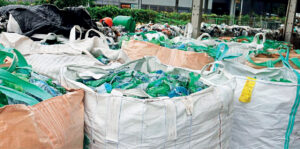
Currently, KDEBWM owns 490 units of garbage compactors, 591 units of Armroll/Roll-On-Off (RORO), six Catch Basin Cleaners (CBC), two high-pressure waterjets, two road-sweepers and 12 4WD vehicles.
To differentiate itself in the market, KDEBWM introduced and adopted smart technologies and innovations, such as IoT and Artificial Intelligence (AI), in their business model and daily operations, which has been the trendsetter for the industry.
“To improve and upgrade our system and services, we adapted and implemented to the new system, technology and IoTs. We want to run our operations and address issues and complaints more intelligently.”
I-Clean Selangor app is one of the earlier smart innovations that KDEBWM developed to ensure complaints by the public and stakeholders are addressed more tactfully and systematically.
The app facilitates residents in Selangor to submit complaints on waste collection and public cleansing to , KDEBWM more efficiently.
“Via the app, people can share images of the uncollected wastes or uncleaned drainage along with the GPS location, and we will respond immediately.
“Vehicle Monitoring System (VMS) is a device installed at our garbage trucks so that KDEBWM can track the movement of the trucks to ensure it has gone through the areas on the stipulated schedule.
“This device will track and monitor whether our garbage trucks have performed the collection accordingly and ensure that we surpass the KPI set by the local council.”
KDEBWM is more than ready to offer solid waste management services across Malaysia and globally.
He said the company has participated in a few tenders in Melaka, Sabah and Pakistan and will continue participating in projects other than in Selangor.
“While our brand as a Smart Waste Management Company is a local
brand, we are aiming to become a world-class player as a total waste solution provider.”
Challenges in the waste industry
Ramli noted the budget allocated for the waste industry was low.
“Although the waste industry rate received by KDEBWM is low, the service rendered to the people of Selangor is first-class.
“The authority has got to take this industry seriously as it affects the standard of living of the 2.1 million taxpayers to lead a clean, healthy and safe lifestyle.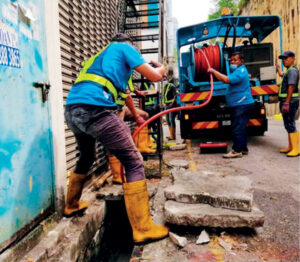
“More budget should be allocated to ensure all categories of waste management in Selangor is managed, be they domestic waste collection, public cleansing, ICI and schedule waste.”
Getting local workers and crews are amongst the biggest challenges for this industry. From KDEBWM’s experience, local people hardly accept employment in the waste management sector. Hence, the dependency on foreign workers.
Operations during the pandemic and floods
Waste management is one of the important service sectors during the Movement Control Order (MCO). As usual, waste collection and public cleansing are carried out according to the work schedule set in all Local Authority (PBT) areas in Selangor.
During this pandemic, there were various challenges in managing solid waste collection and public cleansing services, especially in areas under the Enhanced Movement Control Order (EMCO).
Crew members and supervisors faced difficulties conducting collection and cleaning services in high-risk areas, as there was fear of getting infected.
“We ensured that all Standard Operation Procedures (SOP) are complied with and provided crew members with PPE suits, masks and hand sanitisers.
“It is compulsory for all staff and crew to get vaccinated. We want to make sure all staff and crew work in a safe and healthy environment.”
All KDEBWM 400-strong staff and crew of 11,000 were vaccinated under the Free Vaccination Programme as part of its CSR activities. KDEBWM bore the costs.
The company also donated more than 2,000 waste and recycle bins to NGOs, local councils, schools and mosques and does community work such as gotong-royong and donated basic food necessities to B40 families, the needy and those unemployed due to Covid-19.
KDEBWM spent RM11 million during the Selangor flood disaster on waste collection and clean-up operations.
“This was our first time dealing with post-flood clean-up efforts. We had to make sure that unaffected areas’ waste collections and cleansing operations went on as usual while we mobilized the remaining assets to all the affected areas.”
Almost 50,000 tonnes of bulk waste were collected and sent to the respective sanitary landfills between Dec 22, 2021 and Jan 7, 2022. — @Green


